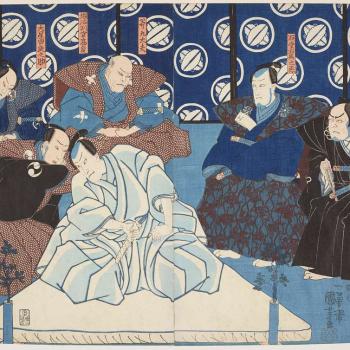Let’s begin by looking at some passages from pieces by Dorothy Day:
Christians when they are seeking to defend their faith by arms, by force and violence, are like those who said to our Lord, “Come down from the Cross. If you are the Son of God, save Yourself.”
But Christ did not come down from the Cross. He drank to the last drop the agony of His suffering and was not part of the agony the hopelessness, the unbelief of His own disciples?
Christ is being crucified today, every day. Shall we ask Him with the unbelieving world to come down from the cross? Or shall we joyfully, as His brothers, “Complete the sufferings of Christ”?
And are the people to stand by and see their priests killed? That is the question that will be asked. Let them defend them with their lives, but not by taking up the sword.
At a meeting of the opposition last week, when a Spanish delegate of the Loyalists told of unarmed men flinging themselves, not from principle but because they had no arms, into the teeth of the enemy to hold them back, the twenty thousand present cheered as one.
In their small way, the unarmed masses, those “littlest ones” of Christ, have known what it was to lay down their lives for principle, for their fellows. In the history of the world there have been untold numbers who have laid down their lives for our Lord and His Brothers. And now the Communist is teaching that only by the use of force, only by killing our enemies, not by loving them and giving ourselves up to death, giving ourselves up to the Cross, will we conquer.
If two thousand have suffered martyrdom in Spain, is that suffering atoned for by the death of the 90,000 in the Civil War? Would not those martyrs themselves have cried out against more shedding of blood?
Prince of Peace, Christ our King, Christ our Brother, Christ the Son of Man, have mercy on us and give us the courage to suffer. Help us to make ourselves “a spectacle to the world and to angels and to men.” Help your priests and people in Spain to share in your suffering, and in seeming defeat, giving up their lives, without doubt there will be those like the centurion, standing at the foot of the cross who will say, “Indeed these men are the sons of God.” (“The Use of Force”)
The Saint would say, and perhaps he would be a very wise man in saying it, “The conquered conquers in the end. Christ was overcome and He overcame. There was His ostensible failure on the Cross, yet He rose triumphant and Christianity spread over the world. The Christian thing to do would be not to resist, but when anyone asked for one’s coat, to give up one’s cloak besides. As Peter Maurin pointed out in the last instance, Australia could be given up to Japanese expansion for instance, if England objected on “noble” grounds for Japan’s aggression in Manchuria. But recognizing that the majority of people are not Saints; that they are swift to wrath, to resist aggression (when they are not the aggressors), then we can only insist ceaselessly that even when the people are taking sides mentally they must keep out, they must not participate in “a War to end War.”
In the last war we helped to impose an unjust peace, even if we grant that we sincerely thought we were engaged in a noble crusade and were throwing our support on the right side in the conflict. We were influenced to this way of thinking not only by deliberate propaganda, but also by the muddle-headedness of pacifists who were not truly “peace-lovers.” (“Pacifism”)
These were, as may be obvious, from the period leading up to Word War II (with the first addressing itself most specifically to the brewing civil war in Spain). But looking past these temporal limitations, we can see what might be called a form of “idealism,” that is a belief in the radical nature of the Christian call. But note that Day never says that violence is wrong in se; she never says that self-defense is always 100% a mistake. Instead, she states that the higher ideal is non-violence, that it is better to do as Christ did and not to strike back than it is to take up the ways of this world.
This is important. It indicates that when Day calls on us to sow the seeds of peace, she does so in an attempt to get us to forsake the world, not to condemn every person who has ever used violence in any way shape or form. In fact, this is clear if we recall what was said above: that the Movement had always included a mixture of extreme pacifists, sympathizers, and opponents of the stance. If it was never mandatory for all Workers, why should we assume she thinks it required of all people (from, say, a soteriological angle)?













